Just Research: A Podcast - Season 1
October 6, 2025
Angela Ciceron
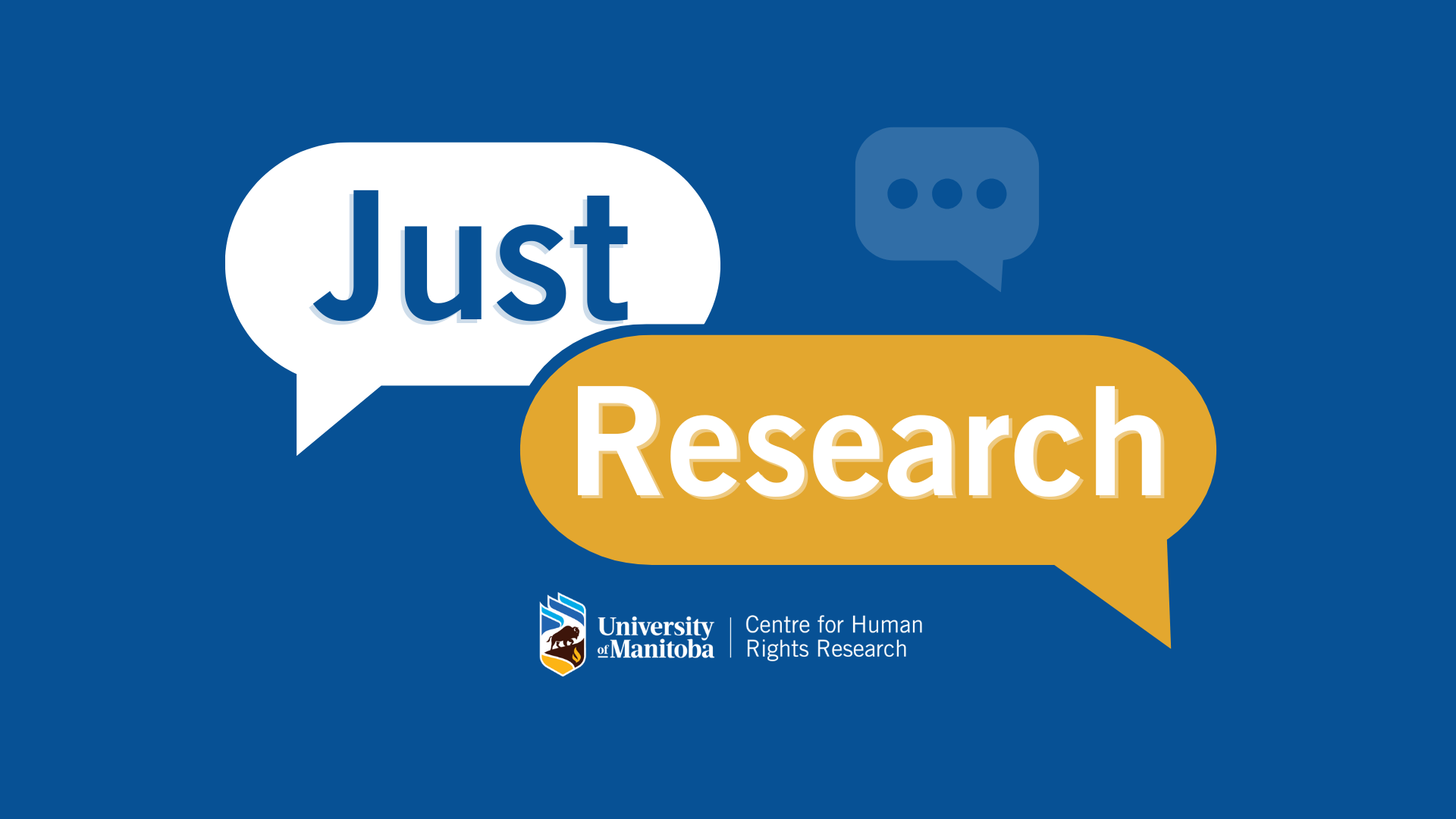
Just Research is a podcast series from the Centre for Human Rights Research at the University of Manitoba. Hosted by Dr. Pauline Tennent and Dr. Adele Perry, the podcast highlights researchers from the UM community and beyond doing work in human rights and social justice in a variety of disciplines.
This season focuses on researchers whose work engages with each of the CHRR’s research themes: Borders and Human Rights, Indigenous Peoples and Human Rights, Reproductive and Bodily Justice, and Water Rights and Justice.
Episode 1: Looking Back on the CHRR and Water Research with Helen Fallding
In the first episode of Just Research, CHRR director Dr. Adele Perry and former CHRR manager Helen Fallding look back to the CHRR’s longstanding work in water rights and justice. In this conversation, they talked about the CREATE H2O program, its interdisciplinary, foundational work in water and sanitation in First Nations communities, and its legacy through the Just Waters project.
Listen now:
Episode 2: On Borders and Human Rights with Dr. Lori Wilkinson
In this episode of Just Reseach, CHRR manager Dr. Pauline Tennent speaks with Dr. Lori Wilkinson, a professor in Sociology at University of Manitoba, about her research on borders and human rights. Dr. Wilkinson’s research has touched on a wide variety of topics surrounding the lived experiences of migrants, refugees, and newcomers in Canada, including their experiences with sexual and gender-based violence.
Listen now:
- Sisic, Mia, Evangelia. Tastsoglou, Lori Wilkinson, Myrna Dawson, Catherine Holtmann, Chantelle Falconer, “The Continuum of Gender-Based Violence Experienced by Migrant and Refugee Women in Canada: Perspectives from Key Informants.” In Special Topic on “Gender and the Continuum of Violence in Migration,” guest-edited by E. Tastsoglou, M. Dawson, J. Freedman, C. Holtmann. In the journal Sociology, Frontiers, 2024
- Luo, Yazhi and Lori Wilkinson (2023) “Asian international students in a mid-sized Canadian City: A Case study of the University of Manitoba” Chapter 14, pp. 202-216 in Asian international students in Canadian universities: Internationalization, racialization and inclusion. Ann H. Kim, Elizabeth Buckner, and Jean Michel Montsion eds. Milton Park, UK: Routledge Press.
- Wilkinson, Lori and Sally Ogoe (2020) “Friendly Manitoba? An Examination of Racism and Xenophobia during the COVID-19 Pandemic” COVID-19 in Manitoba: Public Policy Responses to the First Wave Andrea Rounce, Karine Levasseur, and Shannon Furness eds. Winnipeg: University of Manitoba Press.
Episode 3: On Reproductive and Bodily Justice with Dr. Lindsay Larios
In this episode of Just Research, CHRR manager Dr. Pauline Tennent talks to Dr. Lindsay Larios, an assistant professor in the Faculty of Social Work at the University of Manitoba, about her research in reproductive justice. Dr. Larios’ work explores access to reproductive justice and care for migrants in Manitoba through community-based research approaches.
Listen now:
- https://chrr.info/research-themes/research-themes/reproductive-and-bodily-justice/
- https://chrr.info/person/people-_network/lindsay-_larios/
- https://lindsaylarios.com/
- https://www.instagram.com/reprojusticeresearchmb/
- https://chrr.info/current-projects-2/past-projects/period-poverty-and-equity-on-campus-and-beyond/
- Tennent, P., Alemaio, B., Belec, H., Hunter, M., Larios, L., Perry, A., Romero, V., Smith, J., & Vickar, C. (2024). A Report on Period Poverty and Equity, on Campus and Beyond. Winnipeg, MB: Centre for Human Rights Research, University of Manitoba.
- Larios, L., Larsen, P., Olanubi, O., & Oviosun, J. (2023) “Healthcare is a human right”: International student speak out on healthcare inaccessibility in Manitoba. Winnipeg, MB: Canadian Centre for Policy Alternatives — Manitoba.
- Larios, L. (2023). Precarious reproductive citizenship: Employment protections for pregnant precarious status migrants in Canada. Citizenship Studies. DOI: 10.1080/13621025.2022.2073970
- Larios, L. and Cowman, E. (2025). Working toward reproductive justice in Manitoba. Winnipeg, MB: Canadian Centre for Policy Alternatives — Manitoba.
Episode 4: On Indigenous Peoples and Human Rights with Brenda Gunn
On the last episode of Just Research, CHRR director Dr. Adele Perry speaks to Brenda Gunn, a professor in Robson Hall – Faculty of Law at the University of Manitoba, about her research on Indigenous peoples and human rights. Professor Gunn’s work has encompassed a wide variety of topics in this area, including Indigenous and treaty rights in Manitoba, and international law and Indigenous rights.
Listen now:
- https://chrr.info/research-themes/research-themes/reproductive-and-bodily-justice/
- https://chrr.info/person/people-_network/lindsay-_larios/
- https://lindsaylarios.com/
- https://www.instagram.com/reprojusticeresearchmb/
- https://chrr.info/current-projects-2/past-projects/period-poverty-and-equity-on-campus-and-beyond/
- Tennent, P., Alemaio, B., Belec, H., Hunter, M., Larios, L., Perry, A., Romero, V., Smith, J., & Vickar, C. (2024). A Report on Period Poverty and Equity, on Campus and Beyond. Winnipeg, MB: Centre for Human Rights Research, University of Manitoba.
- Larios, L., Larsen, P., Olanubi, O., & Oviosun, J. (2023) “Healthcare is a human right”: International student speak out on healthcare inaccessibility in Manitoba. Winnipeg, MB: Canadian Centre for Policy Alternatives — Manitoba.
- Larios, L. (2023). Precarious reproductive citizenship: Employment protections for pregnant precarious status migrants in Canada. Citizenship Studies. DOI: 10.1080/13621025.2022.2073970
- Larios, L. and Cowman, E. (2025). Working toward reproductive justice in Manitoba. Winnipeg, MB: Canadian Centre for Policy Alternatives — Manitoba.


Water and Justice Resource Guide
Water and Justice Resource Guide
July 23, 2025
Sarah Deckert and Shaylyn Pelikys

The Nibi Declaration of Treaty #3 begins, “Nibi (water) is alive and has a spirit. It is the lifeblood of our mother (aki) and connects everything. It can give, sustain and take life.” Indigenous knowledges teach us to relate to water not as a resource to be extracted but as a living being to be loved and respected. As you engage with the podcasts, documentaries, books and other resources included in this preliminary resource guide, we hope that you will do so while holding on to the central truth of the Nibi Declaration: “Nibi (water) is alive and has a spirit.”
Download the screen reader friendly Water and Justice Resource Guide here:


A Discussion on Indigenous Water (In)Security – HWISE-RCN
A Discussion on Indigenous Water (In)Security - HWISE-RCN
April 2022
HWISE-RCN
With the Household Water Insecurity Experiences (HWISE) – Research Coordination Network (RCN), Dr. Nicole Wilson chaired a panel discussion in April 2022 on the many complexities of water (in)security for Indigenous peoples. Panelists engaged with the ways that water (in)security is (re)produced by jurisdictional and regulatory injustices and the broader political and economic asymmetries created by settler-colonial water governance. They also explored the distinct understandings of security and well-being that flow from Indigenous relationships to water as a living entity and the ways they shape desirable water futures. View the discussion below.

Water Justice is Menstruation Justice: A Conversation with Co-Resistors– Graphic Recording
Water Justice is Menstruation Justice: A Conversation with Co-Resistors-- Graphic Recording
February 20, 2025
Roxanne Balan

In February 2025 Just Waters and the Centre for Human Rights Research hosted a panel on the topic, “Water Justice is Menstruation Justice: A Conversation with Co-Resistors.” We were honored to open the event with a Water & Tobacco Ceremony with Knowledge Keepers Ramona Milliea and Bill Milliea.
Following a presentation from Veronica Brown of Moon Time Connections, a panel discussion moderated by Chrstine Cyr (University of Manitoba) and Dr. Lisa Smith (Douglas College) explored the intersection of water justice and menstruation justice in Canada. Panelists included Emma Cowman (University of Manitoba), Alicia Horton (Douglas College), and Janessa Roy (MTC).
A graphic recording of the discussion was created by Roxanne Balan.

Connecting Gender and Water Justice: A Zine
Connecting Gender and Water Justice: A Zine
March 21, 2025
Just Waters
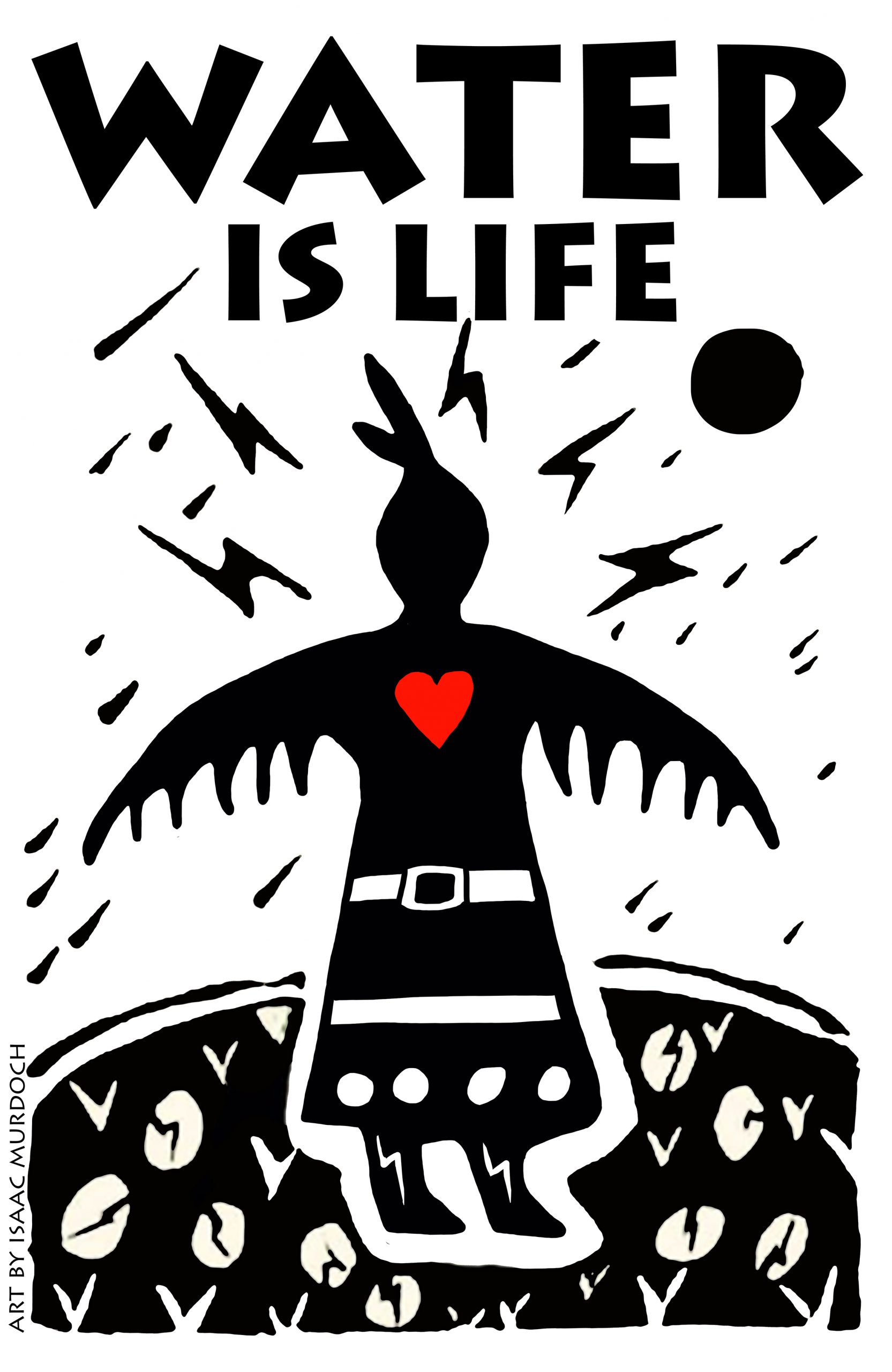
Created by the student research assistants in the Just Waters project, this zine is in commemoration of Women’s Month and World Water Day in 2025, with the aim of connecting water justice and gender equality. The pieces included in the zine were created to celebrate the role of women in protecting water systems, and to call for stronger connections between environmental and gender advocacy.
This zine features the work of the Onaman Collective, which is formed by Indigenous artists Isaac Murdoch and Christi Belcourt. These banners were created for use in actions related to water and land protection. Read more about the banners here.

The Lake St. Martin Story
March 12, 2025
Cameron Armstrong
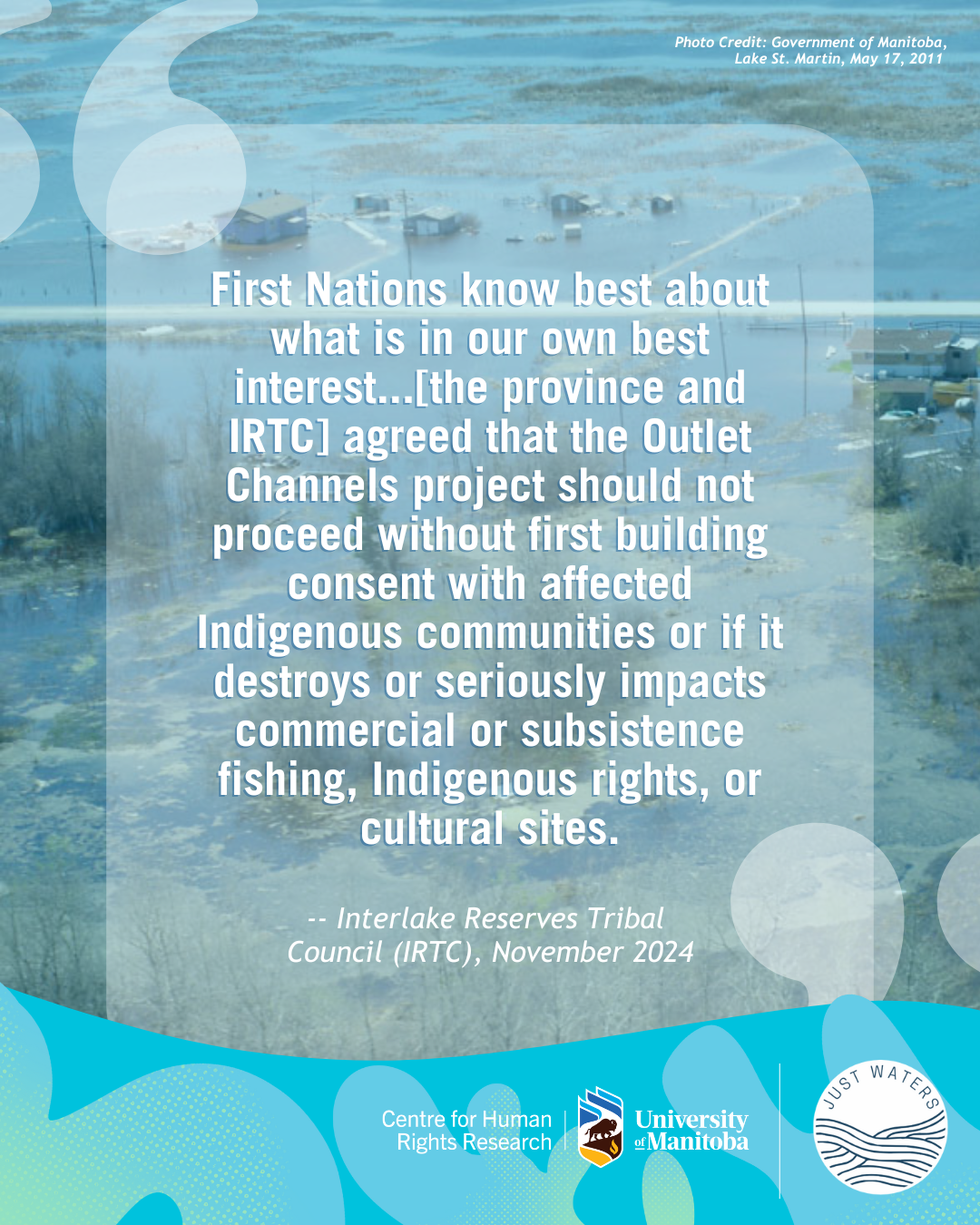
Water control structures have disempowered and displaced First Nations, destroying livelihoods in the name of development, upholding colonial systems and perpetuating environmental racism. One such case is that of Lake St. Martin and the Lake St. Martin First Nation.
As part of the Just Waters project, student RA Cameron Armstrong wrote a plain language summary giving an account of 50+ years of artificial flooding that have impacted the Lake St. Martin First Nation in a myriad of ways, including long term evacuation. Download the resource to find out more.

The Interconnections of Water and Menstrual Justice in Canada
The Interconnections of Water and Menstrual Justice in Canada
February 6, 2025
Emma Cowman
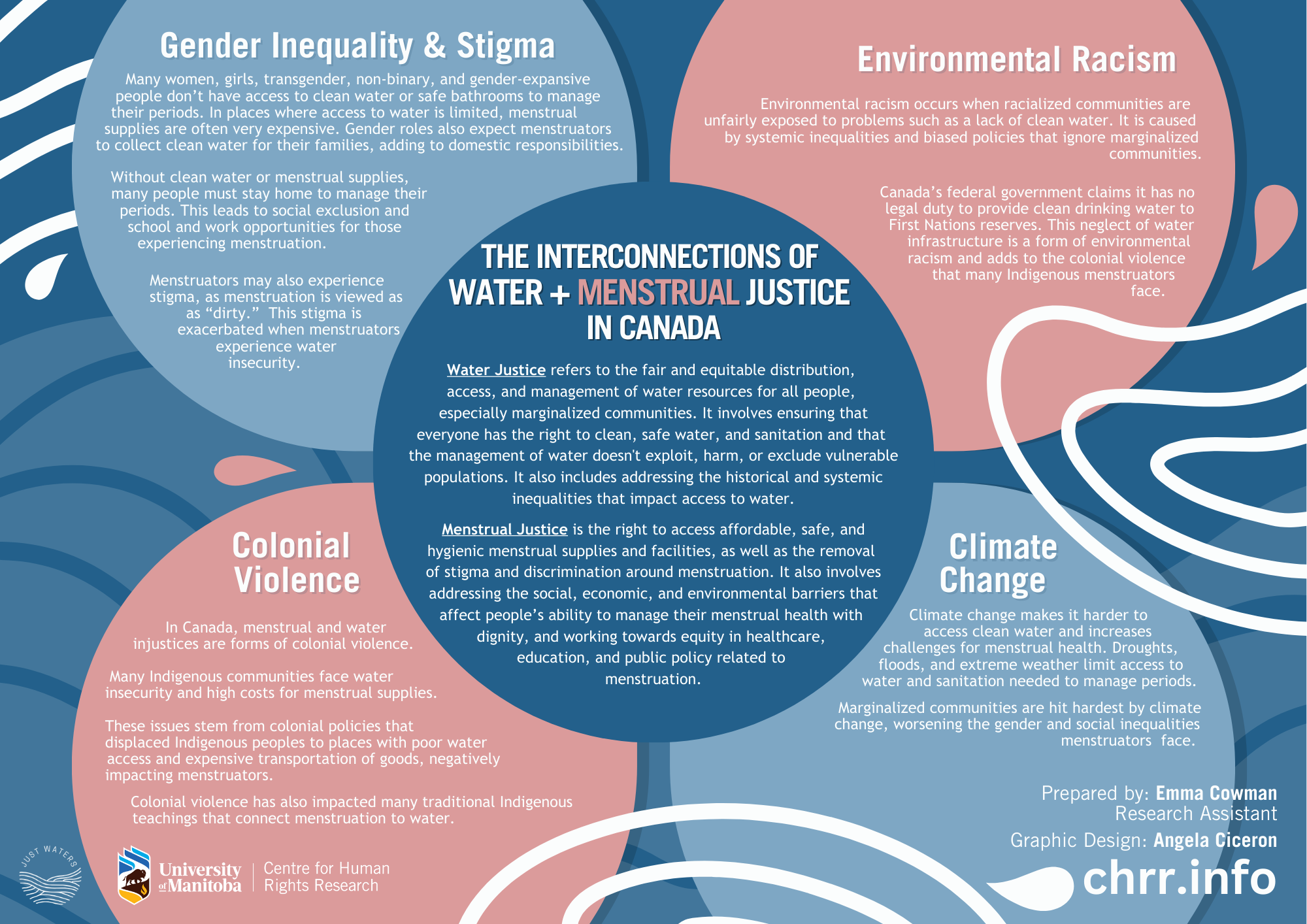
As part of the Just Waters project, researchers, students, and co-resistors from the University of Manitoba, Douglas College, and Moon Time Connections are coming together to explore the interconnections between water and menstrual justice in Canada. Check out this primer to learn more.

The Right to Clean Water in First Nations: The Photovoice Project (2nd Edition)
The Right to Clean Water in First Nations: The Photovoice Project (2nd Edition)
April 2, 2024
Colin Bonnycastle
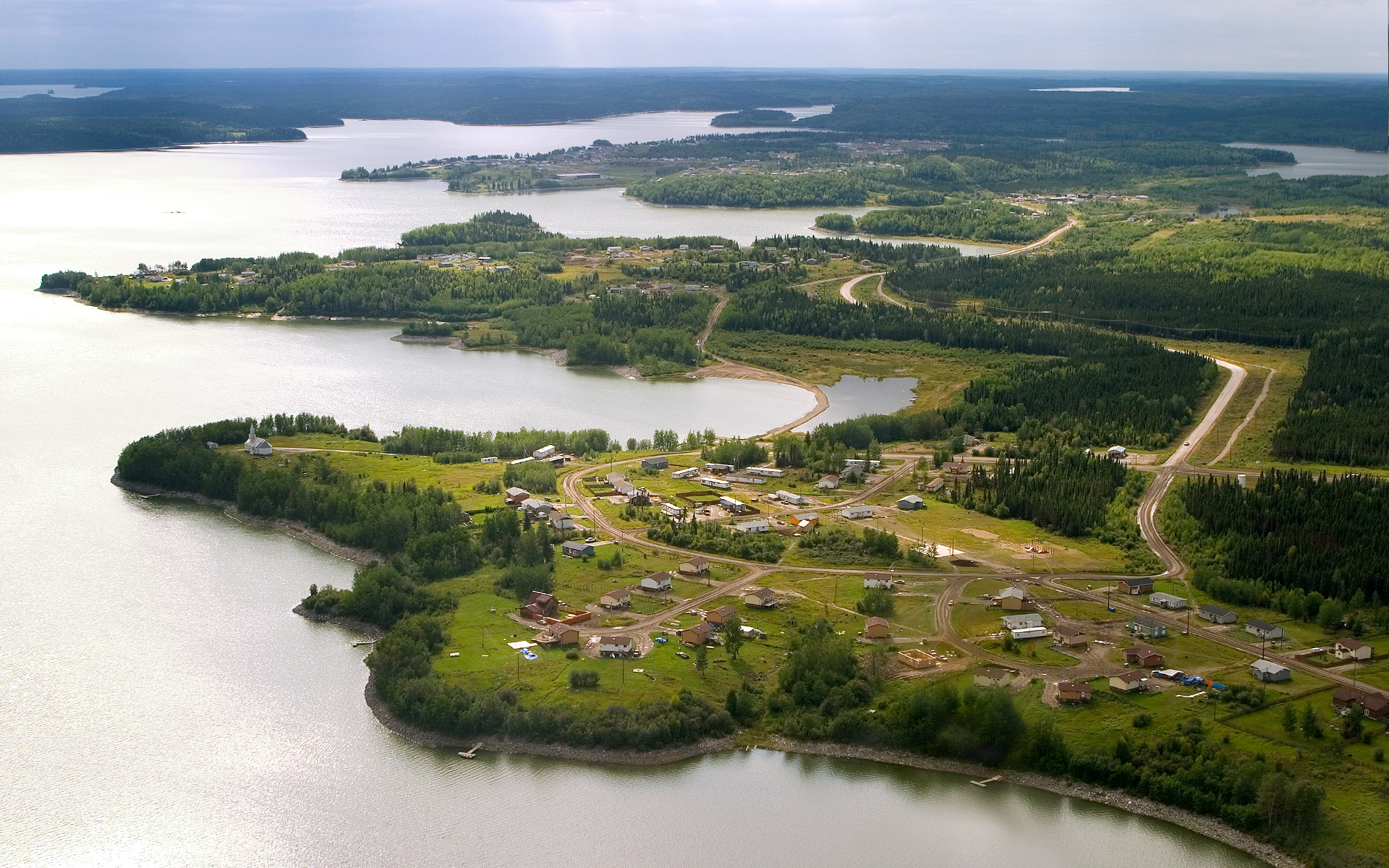
The right to water and sanitation remains a key focus and modern day human rights issue in Canada. Indigenous communities in Canada are overrepresented with respect to poor water quality and water advisories. Protecting Indigenous rights to water and sanitation is best done by community grassroots approach.
This Photovoice project stems from a 2011 SSHRC Partnership Development Grant led by Prof. Karen Busby (Principal Investigator) and Colin Bonnycastle (Co-Investigator). Nisichawayasihk Cree Nation and the students and staff at Atoskiwin Training & Employment Centre of Excellence Centre (ATEC) created a Photovoice Project to bring awareness to the impacts of unsafe drinking water and sanitation practices in Indigenous communities.
The research remains crucial today as communities continue to advocate for access to clean drinking water.
Related Resources
Support Us
Whether you are passionate about interdisciplinary human rights research, social justice programming, or student training and mentorship, the University of Manitoba offers opportunities to support the opportunities most important to you.
Resource Hub
The Right to Food and Community Gardens in Winnipeg: The Meadowood Victory Garden
June 2021
Laura Funk Fabiana Li
The COVID-19 pandemic caused disruptions in the food system that have sparked interest in growing food in home and community gardens. This research investigated the concept of “Victory Gardens” (food gardens popularized during wartime) as a response to the COVID-19 pandemic, using the Meadowood Victory Garden in Winnipeg as a case study. The research examined the potential of using the city’s green spaces, water and infrastructure to grow food for urban residents during the pandemic and beyond.

UN Declaration on the Rights of Peasants
February 24, 2021
Geneviève Savigny, Jessie MacInnis, Nadia Lambek, Dr. Annette Aurélie Desmarais
On Feb. 24, 2021, the Centre for Human Rights Research presented a panel on the “UN Declaration on the Rights of Peasants: What it Means for Canada” with a focus on:
- Why is UNDROP necessary? (Geneviève Savigny, La Vía Campesina’s Peasant Rights Collective, Confédération Paysanne, France)
- What Does UNDROP Mean for Canada? (Jessie MacInnis, La Vía Campesina’s Peasant Rights Collective, National Farmers Union)
- The Rights of Migrant Farm Workers in Canada (Nadia Lambek, human rights lawyer & chair, Canadian Association for Food Law and Policy)
The United Nations Declaration on the Rights of Peasants (UNDROP) provides a framework for transforming “the corporate-led industrial system to a more socially just and ecologically sustainable food system,” according to University of Manitoba Prof. Annette Desmarais. She chaired an online panel discussion Feb. 24, 2021, about what the relatively new document might mean for Canada.
People of the land
UNDROP defines a peasant as “any person who engages or who seeks to engage alone, or in association with others or as a community, in small-scale agricultural production for subsistence and/or for the market, and who relies significantly, though not necessarily exclusively, on family or household labour and other non-monetized ways of organizing labour, and who has a special dependency on and attachment to the land.”
History of UNDROP
Early negotiations around developing international instruments to support farmers and peasants began at the turn of the 21st century.
Geneviève Savigny, a leading member in La Vía Campesina’s Peasant Rights Collective, said the 2008 food crisis helped catalyze international recognition of the importance of food security.
“In September 2012, there was a resolution passed in the United Nations Human Rights Council to establish the first Open-Ended Intergovernmental Working Group (OEIWG) to start negotiating, finalizing and to submit a draft of the declaration,” she said.
In five OEIWG sessions held between 2013 and 2018, the intended scope of the declaration was expanded to include fishermen, pastoralists, Indigenous peoples and other food producers.
The final draft of the declaration included 28 articles ranging from the rights to natural resources and development, to the rights to education and training. It passed in the UN General Assembly Dec. 18, 2018.
Canada abstained from the vote.
UNDROP in Canada
The Canadian constitution divides jurisdiction over work on farms between the federal and provincial governments.
Nadia Lambek, chair of the Canadian Association for Food Law and Policy, said provincial employment standards legislation excludes farm workers. This means there are no maximum hours of work, no legislated rest periods and no minimum wage.
“An employer can have an employee work for 14 days straight without any overtime and without any public holidays,” she said.
In 2011, the Supreme of Canada ruled that farm workers do not have the right to unionize and bargain collectively.
Although Canada abstained from the declaration vote, National Farmers Union Youth Vice-President Jessie MacInnis said UNDROP can still be used a “legal tool for change.”
“Many of the rights violations often assumed to be closely associated with lower-income countries are actually well and alive here in Canada,” she said.
MacInnis highlighted that the movement for food sovereignty underway in Canada signals a shift from a market-based approach to agricultural policy. To steer this momentum towards reform, MacInnis suggests using the language of the declaration as a “rallying point.”
“In my opinion, the declaration is really the best holistic framework to address the rights violations that the peasant farmers and farmworkers in Canada are experiencing today,” she said.

Contact Us
We’d love to hear from you.
442 Robson Hall
University of Manitoba
Winnipeg, Manitoba
R3T 2N2 Canada
204-474-6453
Quick Links
Subscribe to our mailing list for periodic updates from the Centre for Human Rights Research, including human rights events listings and employment opportunities (Manitoba based and virtual).
Land Acknowledgement
The University of Manitoba campuses are located on original lands of Anishinaabeg, Ininew, Anisininew, Dakota and Dene peoples, and on the National Homeland of the Red River Métis.
Centre for Human Rights Research 2023© · Privacy Policy

